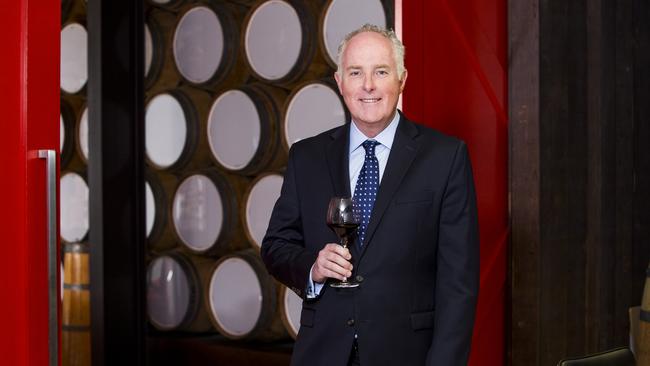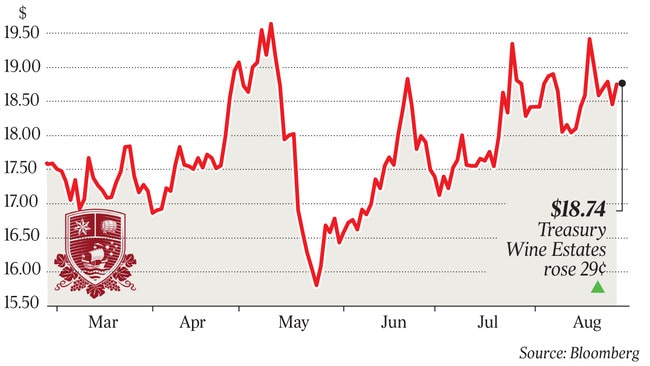Treasury capitalising on China’s growing thirst for Aussie wine
Treasury Wine is aggressively expanding its footprint in China, the world’s fastest-growing wine market.

At a ceremony in Shanghai last week, executives from Treasury Wine Estates signed a deal with Chinese liquor giant Luzhou Laojiao to distribute some of its most prestigious brands, including its flagship Grange.
Under the deal, Luzhou Laojiao, a high-end liquor distributor in China, will distribute Saltram, one of its brands produced from the Barossa for the Chinese market, including a newly created “S tier” of wines.
Luzhou Laojiao chairman Zhang Liang proudly described the deal as a “new chapter in the integration of eastern and western cultures”.
Treasury Wine says the agreement, which will allow the company to distribute Penfolds Bin 123 in China, allows it to tap into Luzhou Laojiao’s strong retail distribution network and pitch its products to the more traditional baijiu market.
The deal is the latest in a series of announcements by Treasury Wine as it aggressively expands its footprint in China, the world’s fastest-growing wine market.
Treasury Wine does not break out its earnings from China, opting to include them in broader Asian results.
But this month’s results confirm the market is one of the most powerful drivers behind Treasury Wine’s growth, and was critical to its 34 per cent jump in net profits to $360m for the year ended June 30.
“Treasury Wine is making shitloads of money with the China-led Asian market leading the way for the company,” commentator Jim Boyle wrote this week on online website The Grape Wall of China.

Announced before the government’s move to block Chinese telco Huawei from supplying equipment for Australia’s 5G market, Treasury Wine will hope it is not singled out in any way for retaliation by Chinese authorities angry about the decision.
Treasury’s wine shipments from Australia to its warehouse in Shanghai experienced delays earlier this year, in measures seen as a gentle reminder of China’s anger at increasing political tensions with Australia. The shares were marked down this week after the Huawei decision.
The company is not commenting on the Huawei decision, or its potential impact on its business in China, and says the delays in its shipments earlier in the year “appear to have abated”.
But even before this week’s decision on Huawei, the company was making plans to minimise any effects of the delays, which have affected shipments to its new warehouse in Shanghai but not direct shipments to customers.
When it sends its latest Penfolds collection of luxury wines to China — including its famous Grange — in October it will send them directly to major customers.
Shipments to the new warehouse were the ones targeted by authorities for extra scrutiny amid political tensions between Australia and China.
No one knows if that was the reason why the shipments to the warehouse were targeted for extra inspection, but Treasury Wine’s CEO Michael Clarke is not taking any chances.
“We are still using the direct shipment model,” Clarke said in the company’s latest results briefing.
“We have got the Penfolds Collection release in October and what we do not want to happen is to have it stuck on a wharf.
“We will be doing it directly, as opposed to the warehouse, because we are not going to take any chances on that front.”
Learning to navigate the lucrative China market — including its sometimes sudden regulatory changes and differing supervisory authorities, as well as changing tastes and distribution channels — is all part of the game for Treasury Wine, which has become the largest foreign exporter of wine to China.
“Treasury has gone from being the No 9 imported wine company (selling into China) to a clear No 1 in the space of just four years,” deputy chief operating officer Tim Ford said.
Sales from its Asian division (which also takes in Japan) were up 39 per cent in the year to June 30 to $548m, now making up more than a fifth of total sales of $2.4bn — sales which were only up by 1.1 per cent over the year.
Asia is becoming Treasury Wine’s growth powerhouse.
Earnings from its Asian division before interest and tax over the financial year were up by 37 per cent to $205m — making up almost 40 per cent of total earnings before interest and tax of $530 million (up by 16.5 per cent.)
Some analysts estimate that China sales make up more than half Treasury Wine’s total Asian sales.
Treasury’s flagship wine in China is the Penfolds brand, but it also sells a range of products including Wolf Blass and Rawson’s Retreat, Sterling and Beaulieu Vineyard from the US.
It sells its own brand, Maison de Grand Esprit from France, as well as having a distribution agreement for Mouton Cadet in China.
The company is benefiting from the rising affluence of China’s middle class and its increasing interest in drinking wine.
“The popularity of imported wine continues to grow strongly in China,” Ford says.
He says some of the demand is now coming from millennial Chinese with more female customers also starting to buy wine. This year will also see the release of a new label aimed directly at the China market — Penfolds Lot 518 — which is a fortified Barossa shiraz spiced up with Chinese baijiu, a grain spirit traditionally popular in China.
“We expect this will create an entirely new category in China which has the potential to be of great appeal to customers,” Ford says.
Lot 518 will have 6 per cent baijiu, which will be enough to impact the taste but won’t have the high alcohol content of the traditional product.
Looking ahead, Treasury Wine is also gearing up for the giant November 11 Singles’ Day online shopping bonanza in China, run by e-commerce giant Alibaba, which has become the biggest single shopping day in the world.
Treasury Wine says its warehouse in Shanghai will be an important chain in its distribution plans for China.
“The warehouse model is important as it allows us to offer a wider range of our wines across our portfolio to smaller retail customers,” Ford told The Australian.
Meanwhile, the company will continue to build new inventory in Shanghai.
“Product being aged in a warehouse in South Australia can also be aged in a warehouse in Shanghai,” Clarke says.
“We will get the warehouse model to work in China.”



